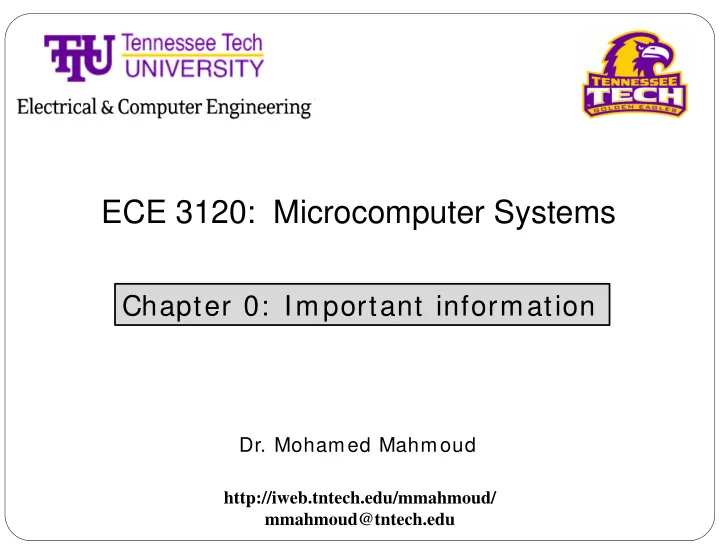

ECE 3120: Microcomputer Systems Chapter 0: Important information Dr. Mohamed Mahmoud http://iweb.tntech.edu/mmahmoud/ mmahmoud@tntech.edu
1 - Course I nform ation ( 1 / 2 ) Teaching team : Instructor: Dr. Mohamed M. E. A. Mahmoud Office: Brown Hall - 331 lab: Brown Hall - 324 E-mail: mmahmoud@tntech.edu Homepage: http: / / iweb.tntech.edu/ mmahmoud/ TA: Prem Akula Email: PAKULA42@students.tntech.edu Help on labs, grading and project. Lecture: Monday and Wednesday 11: 15 am-12: 10 pm, BRWN 320 Lab: Friday 11:15 am - 1:15 pm in BRWN 320 0 - 1
1 - Course I nform ation ( 2 / 2 ) Course w ebsite: Any course announcements or material will be included on the web site at http: / / iweb.tntech.edu/ mmahmoud/ teaching_files/ undergrad/ ECE3120S15/ ECE3120.html Frequently check this site for updates. Office hours: MW 3:30 to 4:30 . Do not hesitate to contact m e if you have any question or problem 0 - 2
2 - Feedback ( 1 / 1 ) I strongly welcome feedback on how to improve teaching this course. Feel free to talk to me or email me. 0 - 3
3 - Course Description ( 1 / 3 ) Prerequisites: - Number systems and codes - Boolean algebra - Digital system concepts - General programming concepts (C or JAVA) Course Outline:- Chapter 1: Microprocessor architecture Chapter 2: Assembly Programming Chapter 3: Interfacing to a microprocessor Chapter 4: Interrupts Chapter 5: Timer functions 0 - 4
3 - Course Description ( 2 / 3 ) Course Objectives: 1. The general concepts and terminology in computer architecture. 2. The internal organization of a typical microprocessor. 3. The process of developing microprocessor-based software. 4. The architecture of a typical microcomputer board. 5. The instruction set of a microprocessor. 6. The mechanism of interfacing a microprocessor with peripherals. 7. Programming microcontroller application in assembly and C 0 - 5
3 - Course Description ( 3 / 3 ) Misconception: “Assembly language is very tedious because we have to write a long code to do a small task. C language can program the microcontrollers much easier.” Response: Read the previous slide carefully. The main objective of the course is not only teaching a language to program the microcontroller. The main objective is teaching how microcomputer system works. That is why hardware and software are important. C language hides a lot of details. Assembly is the lowest level language. You deal with the hardware directly. We will teach programming using C language as well. 0 - 6
4 - Course Textbook ( 1 / 1 ) Huang, Han-Way, “ The HCS12/ 9S12: An Introduction to Software and Hardware Interfacing” , Second Edition, Delmar Cengage Learning, 2010 0 - 7
5 - Course Evaluation ( 1 / 2 ) 1 - Hom ew ork: 1 0 % of final grade. 2 - Project: One project (to be done individually or in a group of two students). 1 0 % of the final grade. 3 - Labs: Handing out labs reports. 1 5 % of the final grade. 4 - Quizzes: multiples quizzes. 2 0 % of the final grade. 5 - Test : Two tests. 2 0 % of the final grade. 6 - Final exam : The final examination will count for 2 5 % of the final grade. 0 - 8
5 - Course Evaluation ( 2 / 2 ) - All exams are OPEN book, slides, laptops, etc. - Homework : It is NOT permissible to copy solutions from others. - Homework, lab reports, and tests should be neat and legible. 0 – 9
6 - Expectations ( 1 / 2 ) - Attend all lectures and labs: very important to understand the course. - Class participation: Your input is needed for good discussion - Fully understand the slides, lectures, and assignments - Do homework and labs by yourself - Submit organized and neat assignments and projects on time - Be on time (if you are late enter the class quiet) 0 - 10
6 - Expectations ( 2 / 2 ) - Begin working on the homework shortly after it is released. - Focus in classes and take good notes - Get help early if you need. I t is your responsibility to seek help from the instructor. - Begin studying the material the same day it is presented - do not accum ulate lectures – the number of slides may be large – each lecture builds on the previous ones. - Read the slides before I teach them 0 - 11
Questions Mohamed Mahmoud
Recommend
More recommend